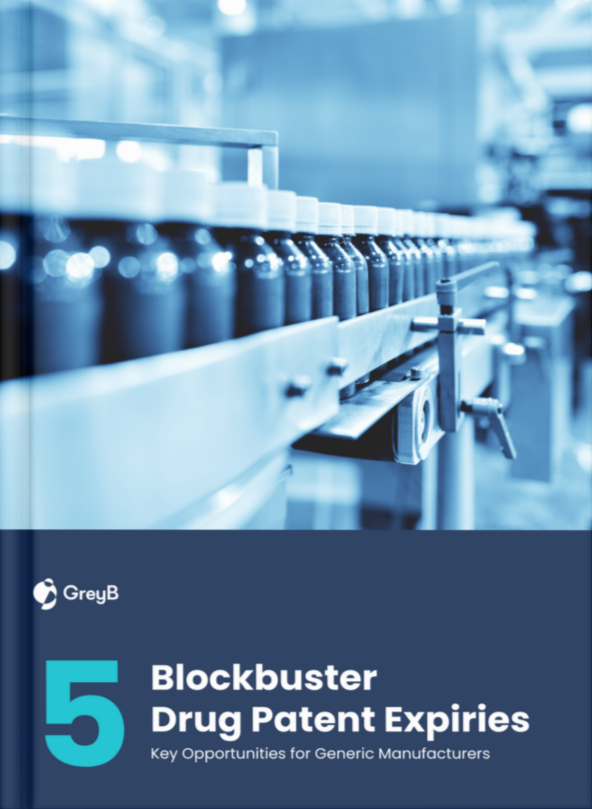Pharma News
14 Apr 2024 to 20 Apr 2024
Apr 16, 2024
IMARC Group Predicts Biosimilar Market to Reach $164.5 Billion by 2032
The global biosimilar market is expected to reach $164.5 billion by 2032, with a growth rate of 25.1% during 2024-2032. The growth of the market is driven by the expiration of patents for blockbuster biologics, which allows biosimilar manufacturers to offer cost-effective alternatives. Factors such as increasing demand for cost-effective treatments and regulatory support and frameworks also contribute to the growth. The leading companies operating in the biosimilar industry include Novartis, Pfizer, Teva, Celltrion, and Merck & Co, among others.
Apr 16, 2024
Johnson & Johnson falls just short of Q1 revenue target due to lower-than-anticipated Stelara sales.
Johnson & Johnson (J&J) has reported a 2.3% increase in sales in the first quarter of 2024, driven by strong performance in its oncology and immunology businesses. However, sales of its psoriasis drug Stelara fell below Wall Street analysts' expectations, causing J&J to miss Q1 revenue estimates. The company's cancer franchise, particularly its drug Darzalex, performed well, generating over $4.8 billion in revenue. J&J expects sales of $88 billion to $88.4 billion for the full year. Meanwhile, the company is awaiting potential US approvals for its lung cancer drug Rybrevant and regulatory filing for Tremfya for other indications.
Apr 16, 2024
J&J's revenue for the first quarter is below expectations due to lower than anticipated sales of Stelara - The Edge Malaysia
Johnson & Johnson (J&J) reported lower-than-expected revenue for the first quarter, with sales of its psoriasis drug Stelara falling short of expectations. The company's CFO attributed the flat revenue to contracting with healthcare providers and pharmacy benefit managers ahead of the drug's loss of exclusivity in the US. J&J has delayed the launch of Stelara biosimilars in the US until 2025 through deals with other companies. Sales of cancer drug Darzalex were in line with expectations, while the company's medical devices unit reported sales below analysts' estimates. J&J also raised its adjusted profit forecast.
Apr 16, 2024
Stelara sales disappointment causes Johnson & Johnson's first-quarter revenue to fall short of expectations
Johnson & Johnson's first-quarter revenue fell short of Wall Street estimates for medical devices. Sales of the psoriasis drug Stelara also came in lower than expected as the company prepares for its loss of exclusivity in the U.S. Despite the underperformance, J&J's cancer drug Darzalex saw a 19% increase in sales. The company plans to expand capacity for the cell therapy cancer treatment Carvykti following supply constraints. CEO Joaquin Duato stated that J&J is open to further acquisitions.
Apr 16, 2024
Johnson & Johnson falls short of revenue expectations due to stagnant sales of popular medication
Johnson & Johnson's first quarter revenue fell short of expectations as sales of its psoriasis drug Stelara remained flat at $2.45bn, lower than analysts' predictions. The company attributed the flat revenue to contracting with healthcare providers and pharmacy benefit managers ahead of the drug's upcoming loss of exclusivity in the US.
Apr 16, 2024
Johnson & Johnson's revenue in the first quarter falls short as Stelara sales disappoint.
Johnson & Johnson's first-quarter revenue for medical devices fell short of expectations due to weak sales of vision care products and surgical devices. The company's psoriasis drug, Stelara, also had lower sales than anticipated as it prepares for its loss of exclusivity in the US. Sales of the cell therapy cancer treatment Carvykti also missed estimates due to supply constraints. On a positive note, sales of the cancer drug Darzalex increased by 19%, and J&J announced plans to acquire Shockwave Medical for $13.1 billion.
Apr 16, 2024
Bright Future Ahead for Bexicaserin: Buy Recommendation Supported by Robust Clinical Evidence and Growth Potential...
H.C. Wainwright analyst, Patrick Trucchio, has reiterated a bullish stance on Longboard Pharmaceuticals (LBPH) stock. Trucchio's Buy rating is based on positive data from the Phase 1b/2a PACIFIC trial of LBPH's lead program, bexicaserin, which showed a significant reduction in seizure frequency among patients with developmental and epileptic encephalopathies (DEEs). The analyst also highlights the favorable safety profile and high response rates to bexicaserin treatment, as well as the potential for further clinical development and commercial success. Trucchio projects bexicaserin to be a future blockbuster drug with over $1 billion in peak annual revenues, justifying the Buy rating and a $60 price target for LBPH stock. Citi also maintained a Buy rating with a $40 price target.
Apr 16, 2024
J&J's revenue for the first quarter falls short due to underwhelming Stelara sales.
Johnson & Johnson reported lower-than-expected quarterly revenue, with sales of its psoriasis drug Stelara falling short of expectations due to anticipated competition from biosimilar versions. The company's shares fell nearly 2% in premarket trading. However, sales of its blood cancer therapy, Darzalex, met expectations and are projected to bring in over $11 billion this year. J&J also raised its adjusted operating profit per share outlook for 2024. Other notable products include Carvykti and Tecvayli, which are expected to generate peak sales of over $5 billion.
Apr 16, 2024
Johnson & Johnson exceeds profit expectations in the first quarter due to strong performance of cancer drugs - as reported by ET HealthWorld
Johnson & Johnson reported better-than-expected profits in the first quarter, driven by strong sales of its cancer drugs, including Darzalex, a top-selling blood cancer treatment. Sales of Darzalex increased by 19%, while sales of another drug, Stelara, remained flat. The company expects Darzalex to bring in more than $11 billion in sales this year. Johnson & Johnson has also struck deals to delay competition for Stelara until 2025. The company's adjusted operating profit per share for 2024 is now expected to be between $10.60 and $10.75.
Apr 16, 2024
Intra-Cellular progresses towards FDA submission for major depressive disorder with another successful Caplyta trial.
Intra-Cellular Therapies has announced positive results from a late-stage trial for its depression drug, Caplyta. In the study, Caplyta showed significant improvement in depression severity compared to a placebo when used as an adjunctive therapy on top of existing antidepressant treatment in patients with major depressive disorder (MDD). Caplyta is currently approved for schizophrenia and bipolar depression, but an approval for MDD could result in an additional $1 billion in peak sales. The company is awaiting results from a third phase 3 trial and plans to file for MDD approval with the FDA this year.
Apr 16, 2024
Success in Depression Trial Brings Intra-Cellular Drug Closer to Approval for Expanded Use and Potential Blockbuster Status
Intra-Cellular Therapies has reported positive preliminary results for its drug, lumateperone, in a pivotal clinical trial for major depressive disorder. The drug met the primary trial goal of statistically significant and clinically meaningful reductions in depression scores, as well as a key secondary goal of reducing illness severity and response to treatment. The results support the expansion of the drug's label and have caused shares of Intra-Cellular to rise by over 25%. Lumateperone is currently approved for the treatment of schizophrenia and bipolar depression.
Apr 16, 2024
Anticipated rise in new obesity drug introductions in the US within the next five years, as reported by biopharma-reporter.com
Pharmaceutical companies are rushing to develop and launch obesity treatments following the success of Novo Nordisk's Wegovy and Eli Lilly's Mounjaro. Data and analytics firm GlobalData predicts that there will be 13 obesity drug launches in the US in the next five years. The demand for obesity treatments is increasing due to rising obesity rates, which are predicted to reach 50% of US adults by 2030. Novo Nordisk is expected to lead the market with six of the 13 launches. The obesity market is set to rapidly expand, offering significant revenue potential for drug developers.
Apr 16, 2024
Prescriptions for a Humira biosimilar start to increase rapidly - Axios
Prescribing of biosimilars for AbbVie's rheumatoid arthritis drug Humira surged after CVS Health dropped coverage for Humira and added lower-cost biological alternatives to its formulary. Humira biosimilars made up 5% of the market and increased to 36% within a week. Sandoz's biosimilar called Hyrimoz accounted for 93% of all new prescriptions of Humira biosimilars.
Apr 15, 2024
Anti-Counterfeit Firm Identifies Over 250 Websites Selling Counterfeit Weight-Loss Drugs
Cybersecurity firm BrandShield has taken down over 250 websites that were selling counterfeit versions of popular weight-loss and diabetes drugs in the GLP-1 class. The majority of the pharmacy websites closed by the company last year were related to GLP-1 medicines, including Novo Nordisk's Ozempic and Wegovy and Eli Lilly's Mounjaro and Zepbound. Fake versions of these drugs have caused harm in several countries. BrandShield, which works with the Pharmaceutical Security Institute, collects evidence of counterfeit products and submits it to service providers hosting the websites. The company also removed nearly 4,000 listings for fake drugs on social media platforms.
Apr 15, 2024
FDA Approves Pfizer's Xeljanz for Fourth Medical Use - Source: Yahoo Canada Style
The FDA has approved Pfizer's drug Xeljanz for the treatment of active polyarticular course juvenile idiopathic arthritis (pcJIA) in children and adolescents aged 2 and older. Xeljanz is a JAK inhibitor and is already approved for rheumatoid arthritis, psoriatic arthritis, and ulcerative colitis. The approval for pcJIA will expand the drug's patient population and drive sales for Pfizer. Xeljanz is a key revenue driver for the company, with sales of $1.09 billion in the first half of 2020.
Apr 15, 2024
Analysis of China's drug patent linkage system features and results
China's pharmaceutical patent linkage system aims to promote a balance between innovation, imitation, and public health. The system provides early warning and prevention of generic drug marketing through patent listing, safeguarding innovation rights. It also reduces patent infringement risk for generics post-marketing, stimulating patent challenges and improving overall drug accessibility. China has implemented measures to ensure timely review of generic applications and restrict first generic exclusivity to avoid a monopoly. Branded drug manufacturers should pay attention to the influence of patent linkages and submit timely patent infringement lawsuits when generic drugs are marketed. Generic drug manufacturers have carried out patent challenges earlier, with most falling under P4.2 certifications, indicating a preference for less difficult lawsuits that do not fall within patent protection. Foreign manufacturers should familiarize themselves with China's patent linkage system to seek the most favorable type of patent certification. However, the study has limitations due to the short implementation time of the system and the statistical limitations of the sample.
Apr 15, 2024
Bio-Path Holdings increases its international patent collection
Biotechnology company Bio-Path Holdings has announced the receipt of newly issued patents in Mexico, Australia, and Japan, as well as an update on its global intellectual property portfolio. The patents cover the company's DNAbilize liposomal delivery and antisense technology, which is used to develop targeted nucleic acid cancer drugs. The patents provide protection in multiple countries and give Bio-Path an additional 20 years of patent exclusivity for its technology. The patents also allow the company to apply its technology to new protein targets.
Apr 15, 2024
Celltrion and Samsung Bioepis are competing for the top spot in producing biosimilars for Prolia, reports The Korea Times.
Celltrion and Samsung Bioepis are among several pharmaceutical companies racing to develop biosimilars of Amgen's osteoporosis drug Prolia, which is estimated to be worth $5.8 billion globally. The patents for Prolia and Xgeva, another drug by Amgen, will expire next year, leading multinational pharmaceutical companies to scramble for a share of the market. Celltrion recently presented the clinical study results of its Prolia biosimilar at a conference, affirming its efficacy, safety, and similarity to the original drug. Samsung Bioepis is also proceeding with the global approval process for its Prolia biosimilar, SB16.

